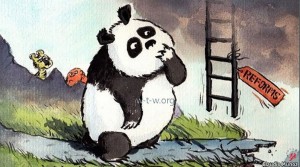Moises Naim writes: The profound impact of Piketty’s book Capital is largely a result of the fact that it was published at a time when growing economic inequality has become an American preoccupation. Since the United States has proven so adept at globalizing its anxieties and exporting its policy debates, the Piketty phenomenon is extending to places where inequality has been pervasive for so long that the public seemed inured to it and resigned to passively accept it. Now, members of many of these societies are actively debating how to bring inequality down.
In order for this discussion to be valuable, however, the problem requires a more complete diagnosis. It is not accurate to assert that in countries like Russia, Nigeria, Brazil, and China, the main driver of economic inequality is a rate of return on capital that is larger than the rate of economic growth. A more holistic explanation would need to include the massive fortunes regularly created by corruption and all kinds of illicit activities. In many countries, wealth grows more as a result of thievery and malfeasance than as a consequence of the returns on capital invested by elites (a factor that is surely at work too).
Corruption-fueled inequality flourishes where there are no incentives to hinder it.
To channel Piketty, inequality will continue to rise in societies where “c > h.” Here, “c” stands for the degree to which corrupt politicians and public employees, along with their private-sector cronies, break laws for personal gain, and “h” represents the degree to which honest politicians and public employees uphold fair governing practices. Corruption-fueled inequality flourishes in societies where there are no incentives, rules, or institutions to hinder corruption. And having honest people in government is good, but not enough. The practices of pilfering public funds or selling government contracts to the highest bidder must be seen as risky, routinely detected, and systematically punished.
Most of the roughly 20 nations from which Piketty forms his analysis classify as high-income countries and rank among the least-corrupt in the world, according to Transparency International. Unfortunately, most of humanity lives in countries where “c > h” and dishonesty is the primary driver of inequality. This point has not attracted as much attention as Piketty’s thesis. But it should.

